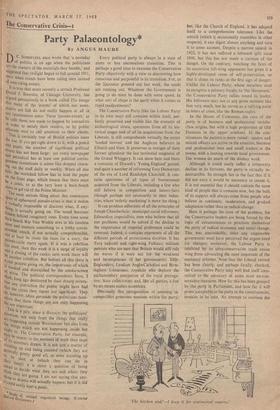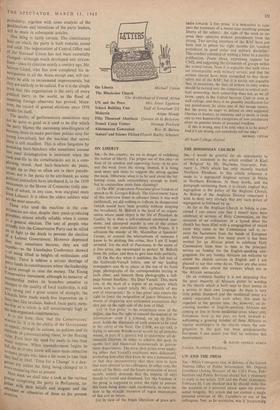The Conservative Crisis—I
Party Palaeontology*
By ANGUS MAUDE
D. C. SOMERVELL once wrote that 'a noonday of politics is an age when the politicians are the masters of the materials they handle,' and suggested that twilight began to fall around 1911, since when events have been ruling men instead of men ruling events.
It is true that more recently a certain Professor
Daniel J. Boorstin, of Chicago University, has argued persuasively in a book called The Image that many of the 'events' of which our news- Papers are full do not really happen at all in any spontaneous sense. These `pseudo-events,' as he calls them, are made to happen by journalists in order to satisfy their readers, or by public relations men to call attention to their clients.
This is certainly true of British politics since
the war. If you get right down to it, with a pencil and paper, the number of significant political events has not been large: yet every newspaper and periodical has at least one political corres- pondent (sometimes it seems like dozens) churn-
out the stuff daily or weekly. When all else
tails, the wretched fellow has to lead the paper on the front page, which means that there must be a crisis, or at the very least a back-bench move to get rid of the Prime Minister. The most serious thing about this continuous "Pate of ephemeral pseudo-crises is that it makes it virtually impossible to discover what, if any- thing actually going on. The wood becomes back-bench behind imaginary trees. Every time some °ack-bench Rip Van Winkle stirs in his timeless sleep and mutters something to a lobby corres- pondent which, if not actually comprehensible, can at least be made the basis for a story, the pseudo-cycle starts again. If it was a rebellion last week, then this week it is a surge of loyalty Land a closing of the ranks; next week there will he another rebellion. But behind all this there is a real process going on, the importance of which
s masked and diminished by the smoke-screen of trivia. The political correspondents have, I think, long ago destroyed by their dreary reitera-
tnM any conviction the public might have had h d at the crises they report are significant. They sn: however, often persuade the politicians them- , Ives that these things are not only happening out are important.
This is a pity, since it distracts the politicians' attention, not only from the things that really are
uaPpening outside Westminster but also from the things which are not happening inside but may to. The Conservative Party, for example,
q he nearer to the moment of truth than most of i
sta ts. members dream. It is not just, a matter of S) ennetirlan4 up and being counted (which they are pretty good at), or even standing up he shot at (which they can do in
asked to it is more a question of being thing to decide what they are and where they
they are going. I am not saying that any- !I-ling so drastic will actually happen; but if it did It could; easily start a panic.
0:,StudY of extinct organised beings. (Concise lord Dictionary.) Every political party is always in a state of more or less unconscious- transition. This is perhaps a good time to examine the Conservative Party objectively with a view to discovering how conscious and purposeful is its transition. For, as the Spectator pointed out last week, the sands are running out. Whatever the Government is going to do must be done with some speed. In what sort of shape is the party when it comes to rapid readjustments?
The Conservative Party (like the Labour Party in its own way) still contains within itself, per- fectly preserved and visible like the contents of archaeological strata, specimens from all its his- torical stages and of all its acquisitions from the Liberals. It still comprehends virtually the entire 'landed interest' and the Anglican believers in Church and State. It preserves in vestiges of their former splendour the last territorial magnates of the Grand Whiggery. It can show here and there a romantic of Disraeli's 'Young England' period, and quite a number of reforming Tory Democrats of the era of Lord Randolph Churchill. It con- tains specimens of all types of businessmen acquired from the Liberals, including a few who still believe in competition and laissez-faire (though perhaps not necessarily in their indus- tries, where 'orderly marketing' is more the thing.)
It can produce adherents of all the principles of Joseph Chamberlain: municipal social reformers; Edwardian imperialists; men who believe that all our problems would be solved if the decline in the importance of imperial preference could be reversed. Indeed, it contains exponents of all the different periods of protectionist doctrine. It has Tory radicals and right-wing Fabians; militant patriots who are sure that Britain would still rule the waves if it were not for the weakness and incompetence of her governments; little- Englanders; Laudian Anglo-Catholics and Birm- ingham Unitarians; royalists who deplore the parliamentary usurpation of the royal preroga- tive; State collectivists; and, like all parties, a few by no means useless eccentrics.
Obviously this juxtaposition of seeming in- compatibles generates tensions within 'the party;
but, like the Church of England, it has adapted itself to a comprehensive tolerance. Like the ostrich (which it occasionally resembles in other respects), it can digest almost anything and turn it to some account. Despite a narrow squeak in 1922, it has not suffered a leftward split since 1846, but this has not made it careless of the danger. On the contrary, watching the fates of its successive left-wing opponents has given it a highly-developed sense of self-preservation, so that it closes its ranks at the first sign of danger. Unlike the Labour Party, whose members tend to recognise a primary loyalty to 'the Movement,' the Conservative Party rallies round its leader. His followers may not at any given moment like him very much, but he serves as a rallying-point in times of crisis, like the Roman eagles.
In the House of Commons, the core of the party is of business and professional middle- class origins, but with a high proportion of Old Etonians in the upper echelons. In the con- stituences the pattern is more varied : squires and retired officers are active in the counties, business and professional men and small traders in the towns, with a leaning towards local government. The women do much of the donkey work.
Although it could easily suffer a temporary decline in its fortunes, the party is virtually in- destructible. Its strength lies in the fact that if it did not exist it would be necessary to invent it. It is not essential that it should contain the same kind of people that it contains now, but the bulk of its support will always come from people who believe in continuity, moderation, and gradual adaptation rather than in radical change.
Here is perhaps the crux of the problem, for the Conservative leaders are being forced by the logic of circumstances to proclaim themselves the party of radical economic and social change. This was unavoidable, since any responsible government must have perceived the urgent need for changes; moreover, the Labour Party is inhibited by its ultra-conservative trade union wing from advocating the most important of the necessary reforms. Now that the Liberal revival has been clearly, and perhaps fatally, checked, the Conservative Party may well find itself com- mitted to the advocacy of some most un-con- servative measures. How far this has been grasped by the party in Parliament, and how far it will prove acceptable to the party in the constituencies, remains to be seen. An attempt to estimate the
'The kitchen sink?-1 keep it for sentimental reasons.'. probability, together with some analysis of the predilections and intentions of the party leaders, will be made in subsequent articles.
One thing is fairly certain. The constituency base on which the party is built remains sound and solid. The organisation of Central Office and of the National Union has not been essentially changed—although much developed and stream- lined—since its creation nearly a century ago. Mr. Selwyn Lloyd, who has now completed his in- vestigations in all the Areas except one, will cer- tainly be able to recommend improvements, but they are unlikely to be radical. For it is the simple truth that this organisation is the envy of every Political party in the world, as the flood of inquiring foreign observers has proved. More- over, the record of general elections since 1950 Speaks for itself. The quality of parliamentary candidates may not be quite as good as it used to be (for which the party blames the increasing unwillingness of business firms to make part-time politics easy for Young executives), but the machine that serves them is still excellent. This is often forgotten by Panicking back-benchers who sometimes assume that .total disintegration is imminent when the rank-and-file in the constituencies are in a corn- Plaining mood. And back-benchers do panic, caught up as they so often are in their pseudo- crises", nor is the panic to be attributed, as some Political journalists have attributed it, to the 1959 newcomers to the House of Commons (only one- third of whom, in any case, won marginal seats 4ciiiri Labour). It is often the oldest soldiers who are the most neurotic. Those who tend the machine in the con- stituencies are also, despite their panic-producing grumbles, almost wholly reliable when it comes [o a general election. The sort of people who actually loin the Conservative Party can be relied On to fight to the death to prevent the election °f a Labour Government. However depressed they may sometimes become, they are still capable—as the Llandudno Conference showed of being lifted to heights of enthusiasm and °YaltY. There is seldom a serious shortage of Party funds in constituencies where the leadership good enough to raise the money. The Young Conservative movement, although its turnover of membership makes its branches sensitive to changes in the quality of local leadership, is still Liberals strong and a great source of strength; the b have made much less impression on it than they like to claim. Indeed, local party mem- bership as a whole is still astonishingly high in the best-organised constituencies. It is not here, then, that the Conservatives' Q°Ili's lie. It is in the ability of the Government appeal, through its actions, its policies and its methods of communicating these, to the floating „er- Even here the need for panic is less than ,'"4..nY suppose. When unemployment begins to tali, the devil they know will seem-more attractive many people who have a lot more to lose than they had in 1945. `Time for a Change' is a dan- erous cry unless the thing being changed to is more reassuring than at present, Next week we shall take a look at the various get PS comprising the party in Parliament, to- l
with their beliefs and slogans and the
relevance or otherwise of these to the present situation.



































 Previous page
Previous page